2023 年 9 月 8 日,Bun.js 发出了第一个稳定版本:Bun 1.0
Bun 1.0 is finally here.
Bun is a fast, all-in-one toolkit for running, building, testing, and debugging JavaScript and TypeScript, from a single file to a full-stack application. Today, Bun is stable and production-ready.
…
Bun is a drop-in replacement for Node.js. That means existing Node.js applications and npm packages just work in Bun.
根据官网的描述来看,Bun 是一个多合一的 JS 工具箱,其中包括运行、构建和调试 JS 和 TS 代码,也就是和 NodeJS、Deno 一样,同样属于 JS 的运行时,不过 NodeJS 已称霸江湖多时,而 Deno 却一直不温不火,就在我们以为 NodeJs 将会一直稳坐王位的时候,前几天这个突然印入眼帘的家伙,Bun,貌似在圈中产生了巨大的讨论,目前看下来,究其原因,一个是基本完全兼容 NodeJs,官方用词为 “drop-in”,我在这里翻译为 “无脑”,是的,无脑替换 NodeJs。还有一个就是讨论声最大的 —— 性能。
API Serving 性能对比
首先我能想到最常见的场景就是 API serving,通过 NodeJs 的 http 模块和 Bun 的 Serve 模块,我做了两个功能一摸一样的 API,GET 的时候返回 “Hello World”:
// NodeJS
import http from 'http'
const server = http.createServer((req, res) => {
res.end('Hello World')
})
server.listen(7900, 'localhost', () => {
console.log('NodeJs server started at http://localhost:7900')
})// Bun
Bun.serve({
fetch(req) {
return new Response('Hello world')
},
port: 7901
})
console.log('Bun server started at http://localhost:7901')两边写法不是很一样,但是基本上都用很短的代码就完成了一个简单的 API,那么测试的代码我们这样写:
let test_subject = 'Node.js' // 或 Bun
let endpoint = 'http://localhost:7900' // 或 7901
// 两次测试以下代码完全一样
let count = 1000
let start = Date.now()
let err_count = 0
console.log('\n========')
console.log(`${count} hello-world api running through ${test_subject}`)
while (count > 0) {
let res = await fetch(endpoint)
await res.text()
count--
}
let end = Date.now()
console.log(`Took ${end - start}ms.`)
console.log(`Got ${err_count} errors.`)
console.log('========\n')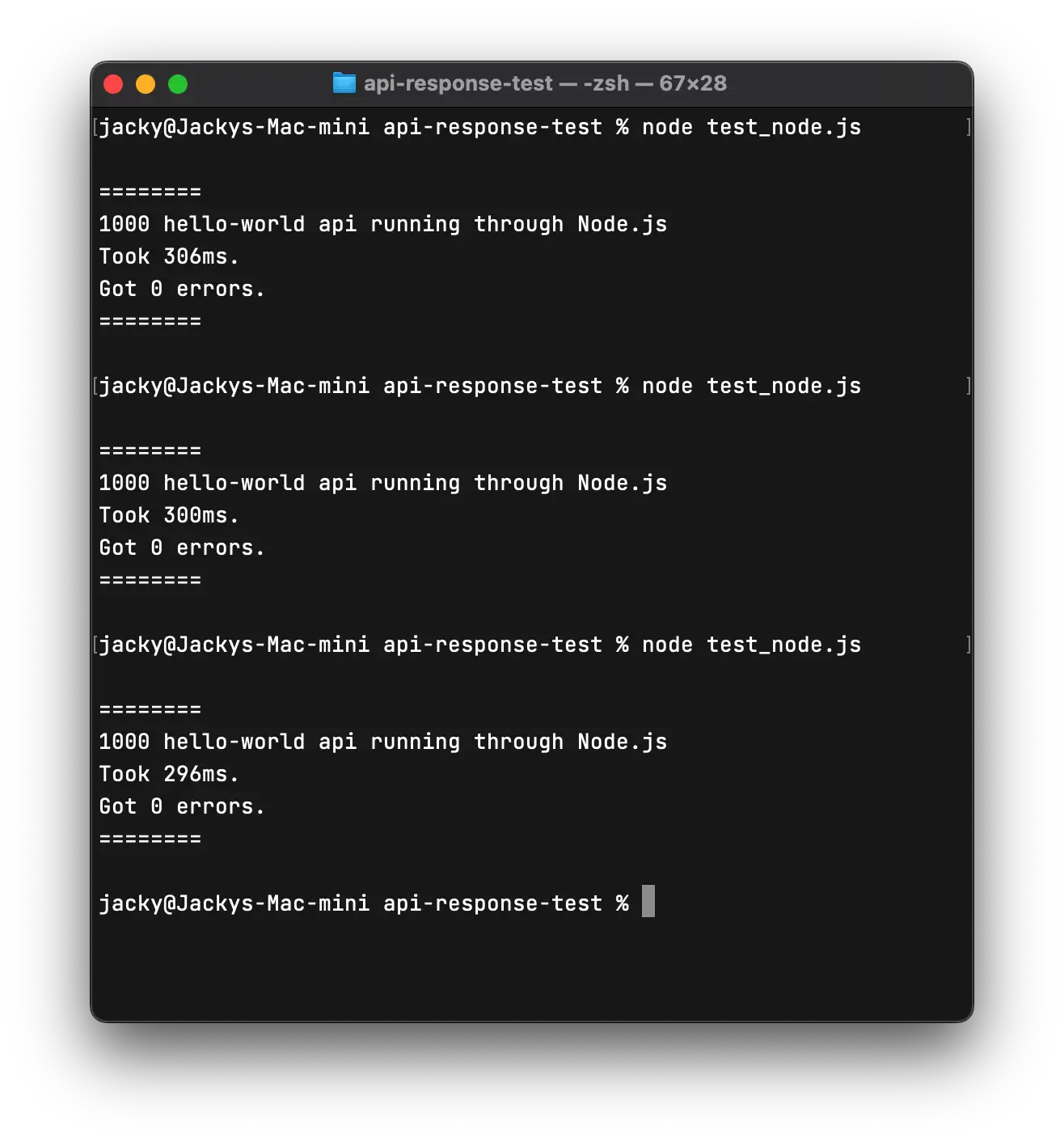
NodeJs 这边三次测试,每次调用 1000 次 API,平均大概在 300ms 左右。再来看看 Bun 这边:
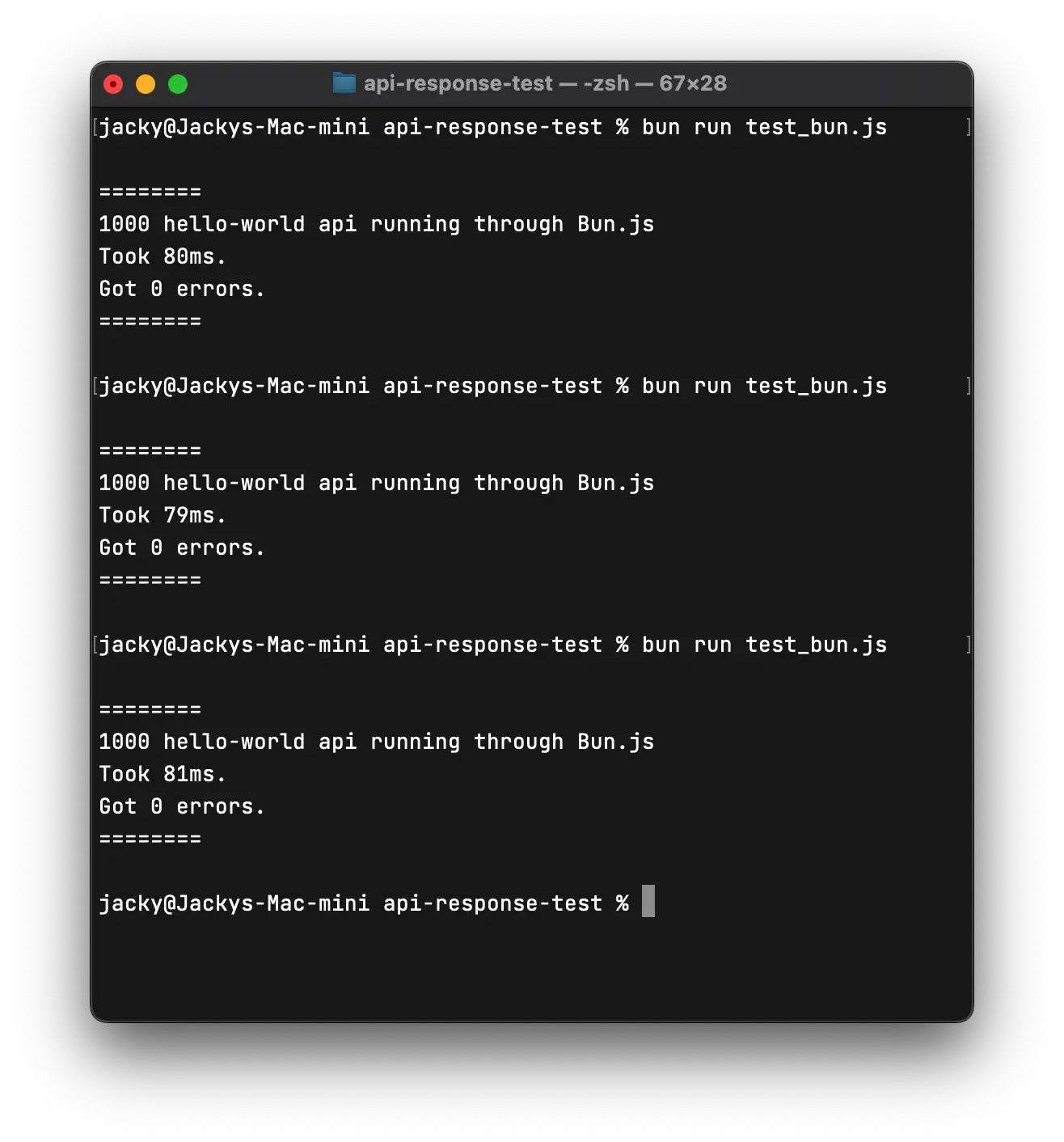
基本维持在 80ms 左右,也就是说,在这个测试中,Bun 的速度比 NodeJS 快大概 3.75 倍。
加密性能测试
在 API 测试中我们看到,Bun 的速度确实是要比 NodeJs 快的,现在我们再来看看加密的速度是不是有区别:
import AES from 'crypto-js/aes.js'
let test_subject = 'Bun.js' // 或 NodeJs
// 两次测试以下代码完全一样
let count = 10000
let start = Date.now()
console.log('\n========')
console.log(`${count} AES encryptions running through ${test_subject}`)
while (count > 0) {
let ciphertext = AES.encrypt('my message', 'secret key 123').toString()
count--
}
let end = Date.now()
console.log(`Took ${end - start}ms.`)
console.log('========\n')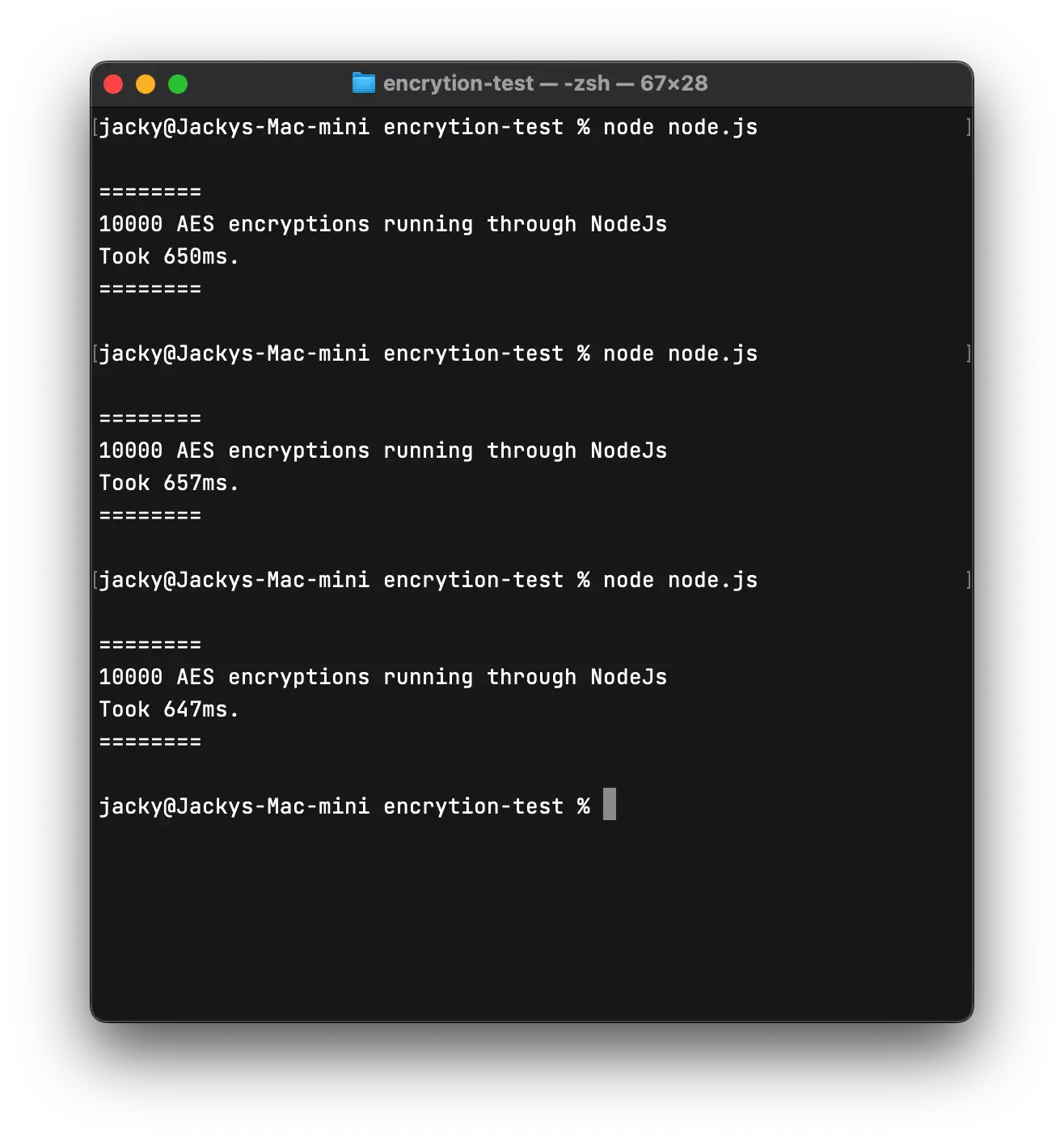
NodeJs 这边 1 万次 AES 加密消耗时间大约在 650ms,再来看看 Bun 这边:
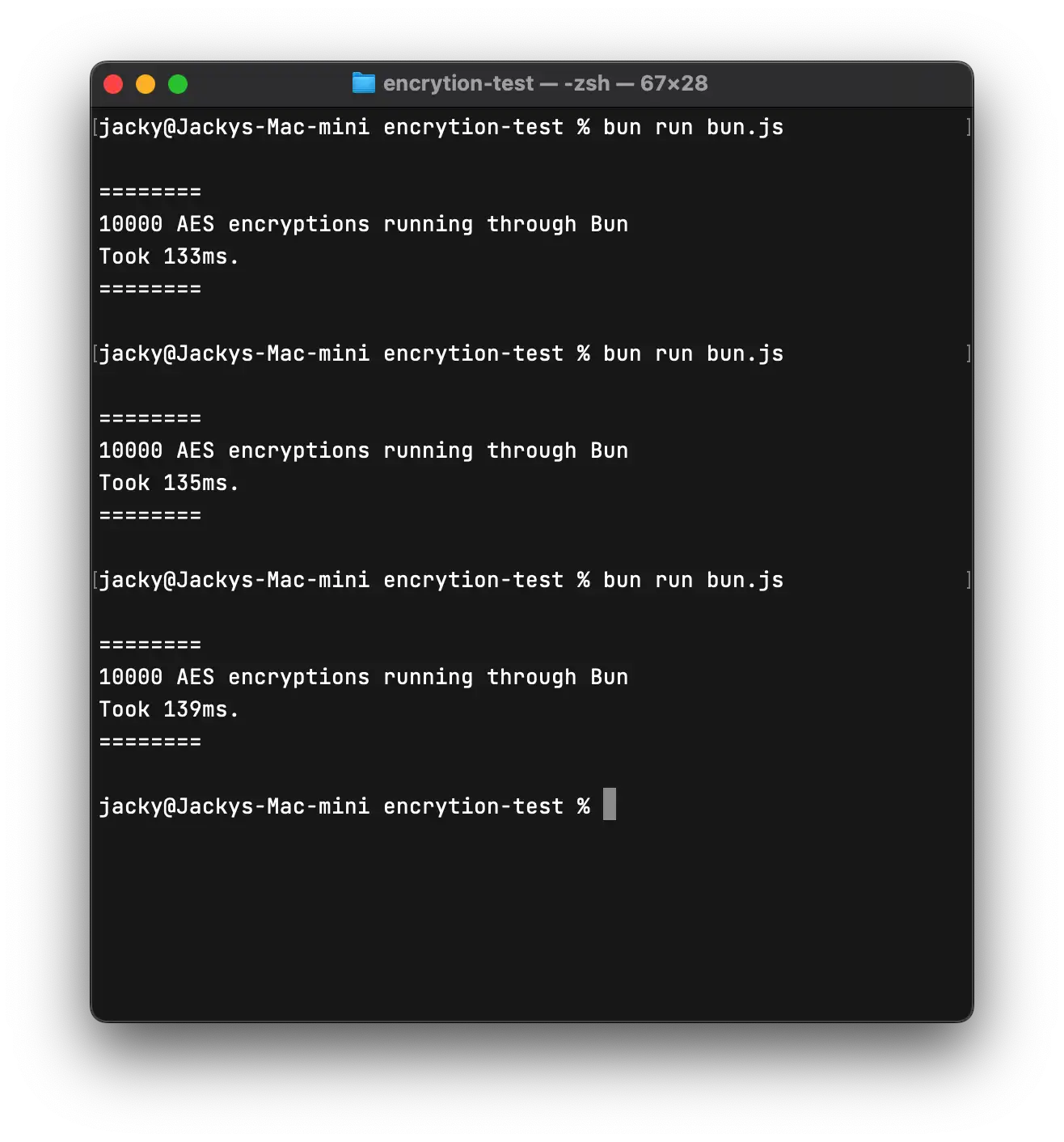
基本在 140ms 左右,在以上测试中我们也看到了,Bun 的速度确实是比 NodeJS 要快的,难道 NodeJs 真的就是被完爆吗?
只能说,不完全是。
算数性能测试
我们使用程序随机生成两个数字 a 和 b,再去计算 a 的 b 平方,分别计算 1 亿次。
let a = Math.random()
let b = Math.random()
let start = Date.now()
let count = 100000000
console.log('\n========')
console.log(`${count} Math.pow() running through NodeJs`)
while (count > 0) {
Math.pow(a, b)
count--
}
let end = Date.now()
console.log(`Took ${end - start}ms.`)
console.log('========\n')运行之后来看看 NodeJs 这边的结果:
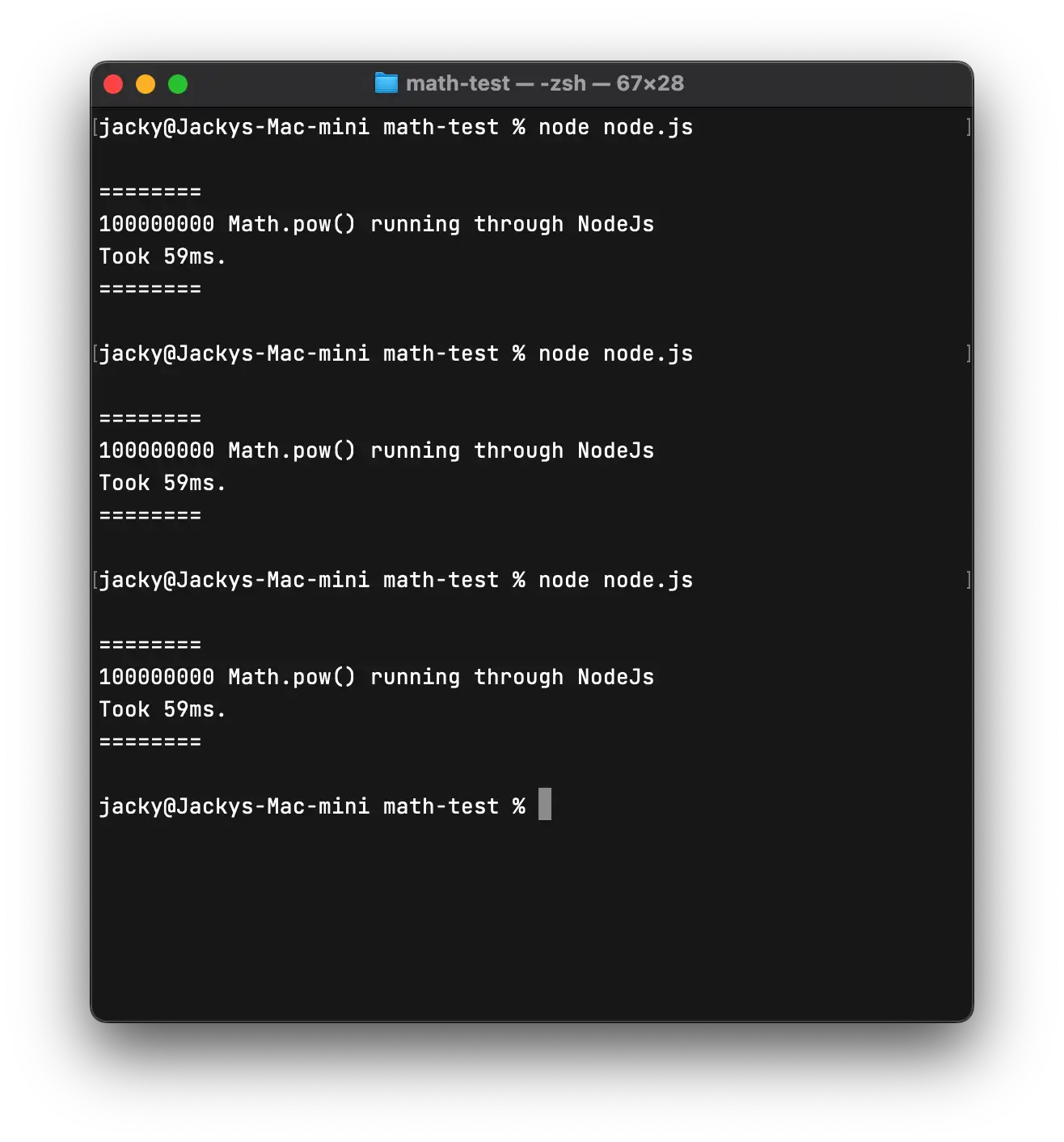
基本维持在 60ms,再来看看 Bun:
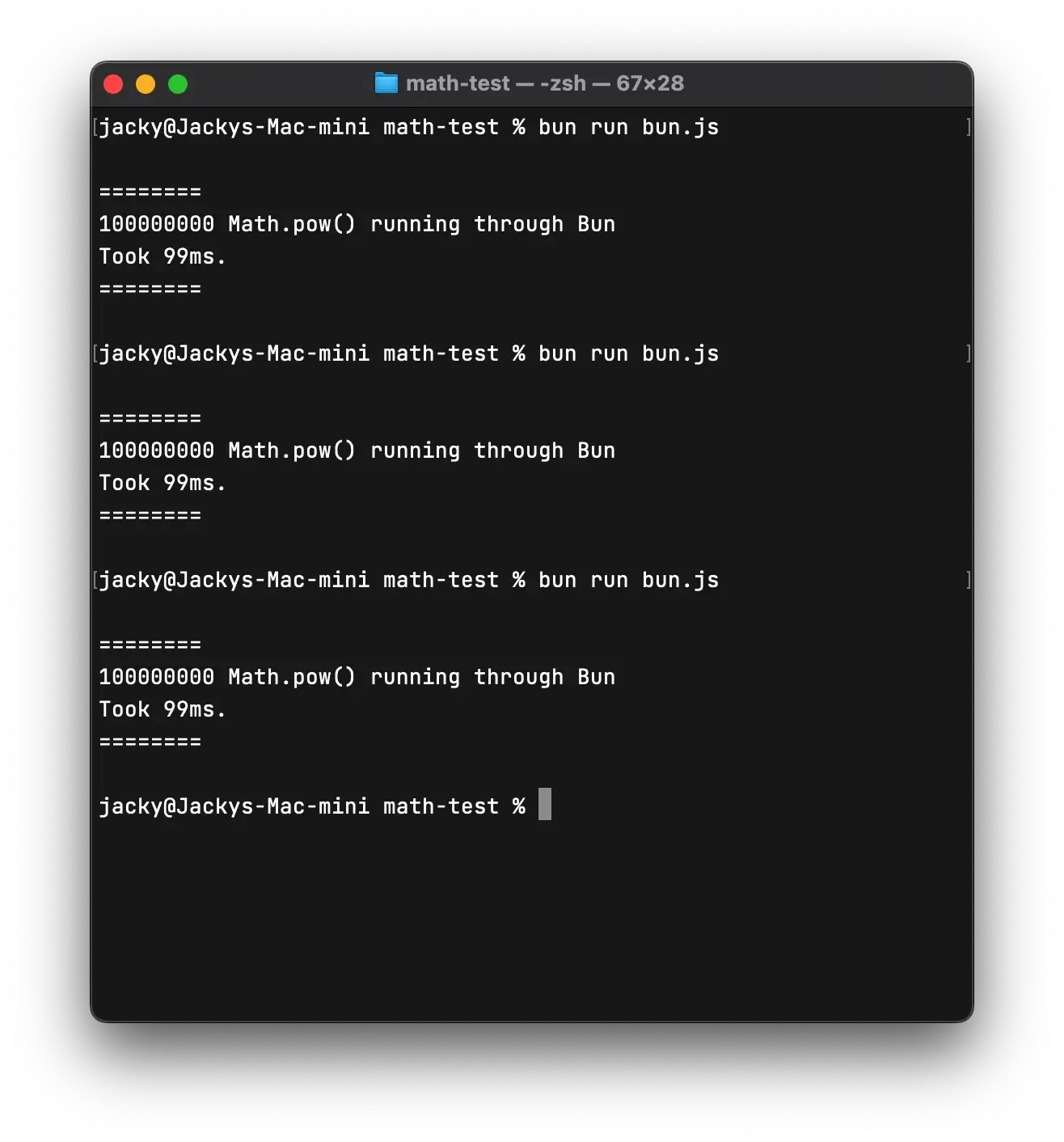
Bun 居然还比 NodeJs 慢了 40ms。
🥲
怎么说呢,以我的智商想要给你们解释这件事情…… 还是太难为我了,我猜大概率还是因为底层 JS 引擎不同导致的(Bun 使用 Safari 的 Js core,NodeJs 使用 Chrome 的 V8),不过 1 亿次计算,40ms 的差距貌似在生产环境中看起来也不是那么明显,毕竟是第一个稳定版本嘛,相信后面 Bun 团队应该会解决的!
我的想法
就在我基本拥抱 Serverless 的时候,Bun 出现了,一开始我会觉得它的出现有点不是时候,但是亲自上手之后,可以说 Bun 又激起了我写 Server-ful App 的兴趣,不仅仅因为性能,更加是因为 Bun 的开发体验,很多经过重构的 API 简直美的不像话!
读取文件:
const file = Bun.file('package.json')
const contents = await file.text()WebSocket:
Bun.serve({
fetch() {
// ...
},
websocket: {
open(ws) {
// ...
},
message(ws, data) {
// ...
},
close(ws, code, reason) {
// ...
}
}
});综合来看,Bun 确实是比 NodeJs 要快的,而且是呈倍数的那种快,再加上几乎完美继承 NodeJs 的生态,真的非常看好这个运行时,期待 Bun 团队后面再整大活!